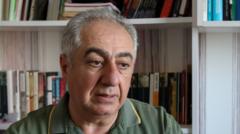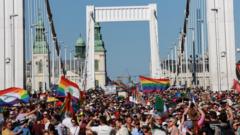As COP29 unfolds in Azerbaijan, concerns are mounting over the government's crackdown on environmental activists, including the detention of prominent figures like professor Gubad Ibadoglu. Human rights groups call for urgent reviews of host country selections for the climate summit, arguing that the suppression of civil society poses a significant threat to climate progress.
Azerbaijani Government Faces Criticism Over Detention of Climate Activists Amid COP29

Azerbaijani Government Faces Criticism Over Detention of Climate Activists Amid COP29
Human rights organizations express concern over the treatment of climate defenders, accusing the Azerbaijani government of suppressing dissent during the global climate summit.
The COP29 climate summit, taking place in Azerbaijan, is under intense scrutiny as human rights organizations allege that the Azerbaijani government is using the international event to suppress dissent and detain climate activists. Reports indicate that professor Gubad Ibadoglu, a well-known researcher on Azerbaijan's oil and gas sectors, has been under house arrest for almost 18 months on dubious fraud charges. His situation raises alarms among human rights advocates, who see a pattern of political repression tied to environmental activism in the country.
Since Azerbaijan was chosen as the host for this year’s summit, there appears to have been a sharp escalation in the arrest of political prisoners, with the total number exceeding 300. Amnesty International's Natalia Nozadze remarked that the political climate in the country has grown increasingly hostile to those who challenge the government's agenda. Such actions, opponents argue, undermine the integrity of COP29, which should serve as a platform for open dialogue and accountability regarding climate action.
Anar Mammadli, another activist who previously pushed for greater governmental adherence to the Paris climate agreement, faces charges of smuggling, further illustrating the repression faced by environmental advocates in Azerbaijan. Activists claim that Azerbaijan's heavy reliance on oil and gas, which constitutes around 60% of its budget, is a barrier to meaningful climate action and reform.
While Azerbaijan claims to support civil society participation, key figures argue that the conditions during COP29 are anything but inclusive. Emin Huseynov, an Azerbaijani journalist, likened the summit to an opportunity for the government to "whitewash" its reputation amid its ongoing human rights violations.
Despite Azerbaijan's claims of impartiality regarding its civil rights record, the country's systematic oppression of dissent parallels similar issues faced by previous COP hosts like the UAE and Egypt. Critics argue that the UN should reconsider its criteria for selecting host countries, ensuring that human rights protections are part of the selection process.
Although the UNFCCC has stated that this year’s host country agreement includes human rights provisions, activists underscore that enforcing these protections falls largely on the international community. Tasneem Essop from the Climate Action Network emphasized the crucial role civil society plays in pushing forward the climate agenda, citing their instrumental role in establishing a loss and damage fund for disadvantaged nations.
Caught in this complex intersection of climate policy and human rights are leaders like UK Prime Minister Sir Keir Starmer, who engaged with Azerbaijani President Ilham Aliyev without confirming whether human rights abuses were on the agenda for discussion. This apparent hesitation has drawn criticism, as observers express concern that the UK government, among others, may be retreating from calling out human rights abuses at international forums.
With civil society under siege both in Azerbaijan and globally, the path forward for genuine climate action relies heavily on the ability of these crucial actors to advocate for accountability and transparency.




















